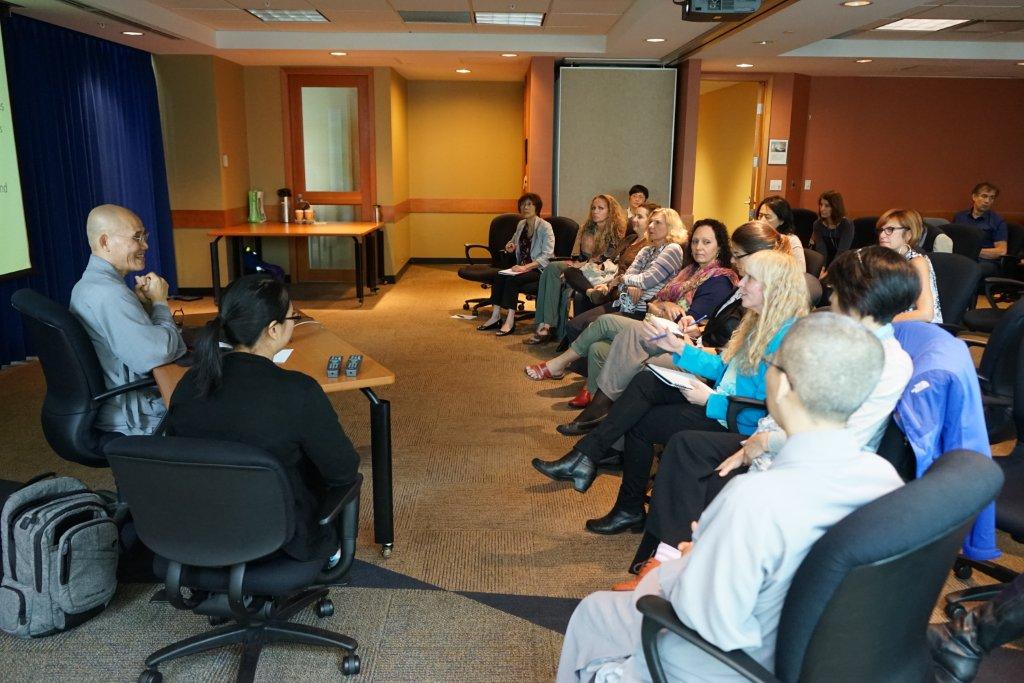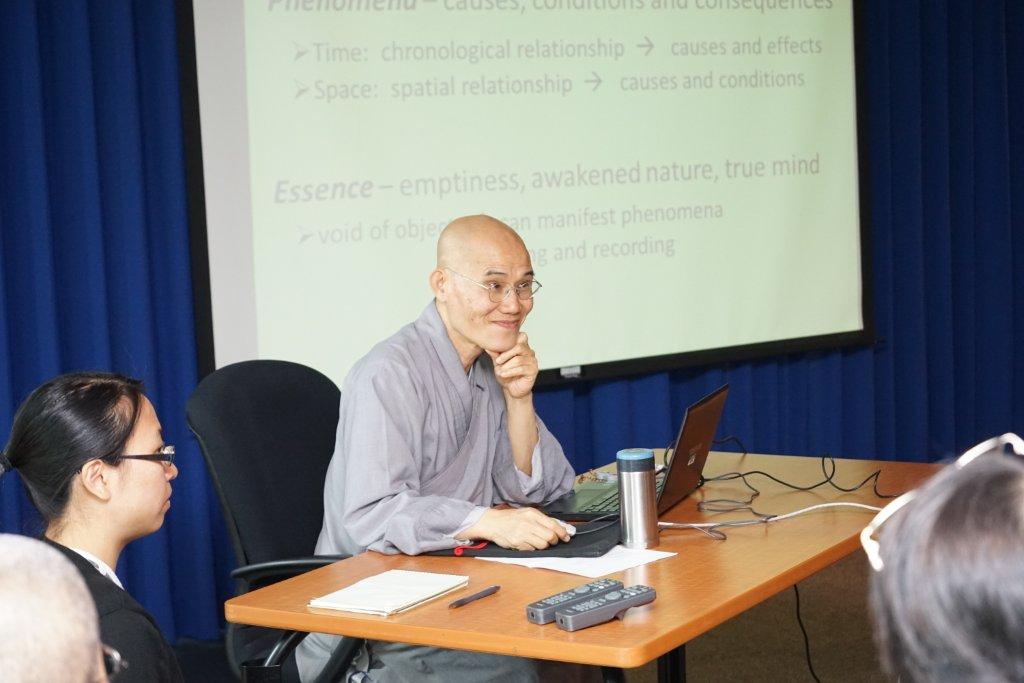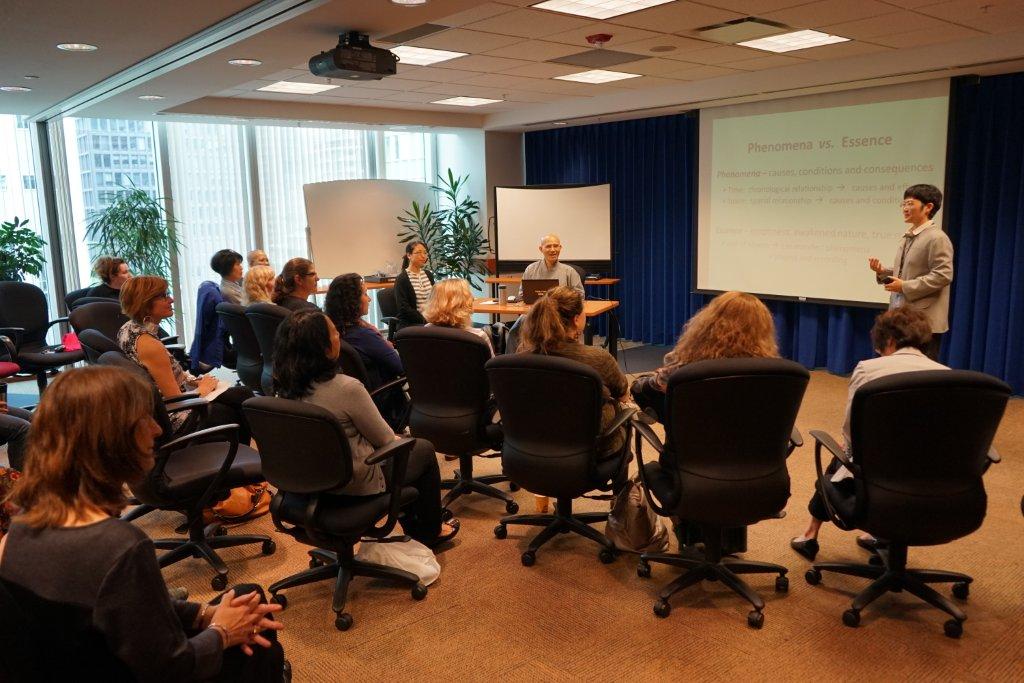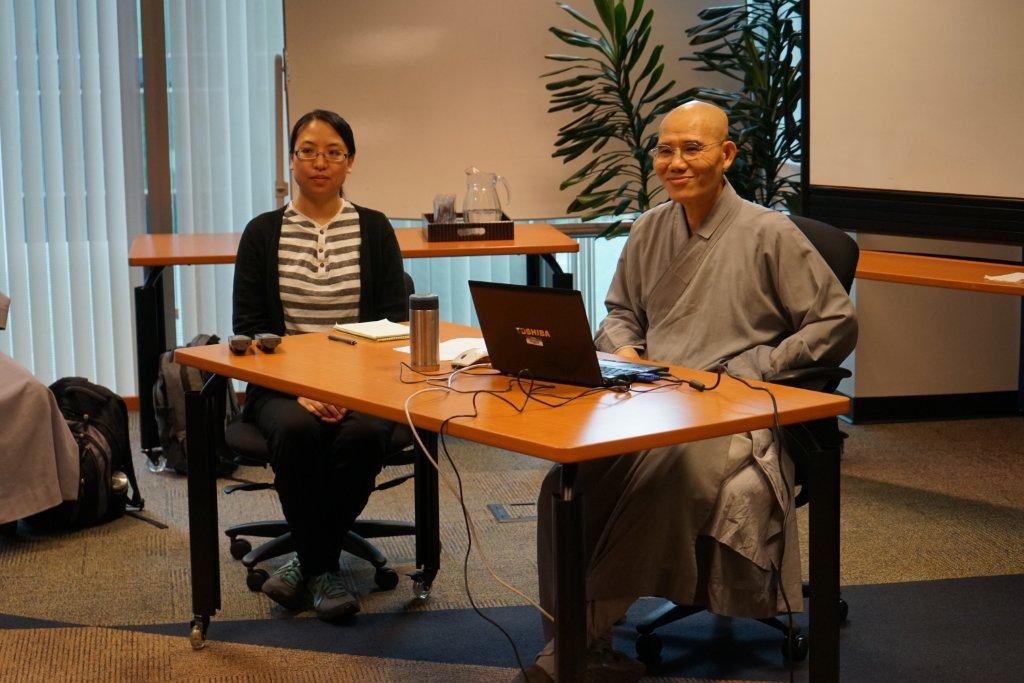Notes from the Venerable Guo Xing’s September 25, 2014 Presentation on Karma

With our great honour and pleasure that we had invited the Venerable Guo Xing, Abbot of Dharma Drum Retreat Center and Chan Meditation Center in New York, to give us a talk on Karma – Causes, Conditions and Consequences on September 25, 2014. This was the third time that Abbot offered his teachings at the offices of Environment Canada and Fisheries and Oceans of Canada in Vancouver.
The Venerable Guo Xing opened his discussion on karma by differentiating between phenomena vs. essence. He divided phenomena into time (chronological causes and effects), and space (spatial causes and effects). In spite of the categorization, he reminded us that all phenomena are impermanent, like the waves that rise and fall in the ocean that are really only water despite our perception of the waves as separate individual entities within the ocean.

The Venerable spoke of essence as the awakened nature, the true mind, which is formless, unmoving and empty. The true mind does not rise and perish like phenomena, but rather is the cause and source of all our experiences. The Abbot compared the true mind to the screen on which his presentation is projected, noting that although the slides change, the screen remains unmoving and empty. The true mind being void of objects has the ability to manifest phenomena, including karma. It allows us to see, hear, smell, taste and touch. It records and replays our experiences, yet because we think dualistically, we place judgement on our experiences and edit them through our perceptions. That is why we each experience things differently because our judgement based on our previous background experience influences our perception of the present moment.
So karma manifests from our interpretation of our experiences, not only from our current life but also from our past lives. We are so acclimated to living in the conscious state that we seldom explore our dreams or subconscious for vexations that have carried over from previous lives. The Abbot told us a story of a practitioner he helped who had an irrational fear of water. She would only splash herself with water when she bathed, never immersing herself in a shower or bath as her fear was so strong. She had a recurring recollection through dreams of seeing rays of sun through water above her, causing her arms and legs to become very tense whenever she spoke of it. After participating in a meditation retreat, she was subconsciously drawn to a nearby stream where she realized the haunting recollection was actually her death from a previous life where she was drowned in a huge flood that engulfed her village. The Venerable was able to work with her through that experience to get her to relax her body during the recollection, instead of fighting it or trying to suppress or push it away, learning to accept what had happened, which was the first step to letting go of her vexation. By relaxing and accepting the memory, she was able to overcome what had been an irrational yet paralyzing fear of water and free herself from the terror that had haunted her for as long as she could remember.

The Abbot next spoke of individual and collective karma. As individuals, we manifest karma through our thoughts, speech and body reactions. How we edit our experiences as individuals influences how we perceive our individual karma. The Venerable told a story of a man who won a lot of money. Many of us would think he had good karma to be so fortunate. Yet, he was so afraid of being robbed and losing the money he’d won that he isolated himself, sleeping with a gun under his pillow, suffering from the fear that resulted from his new found wealth. If someone is paralyzed into inaction by the fear of bad karma, it becomes a self-fulfilling prophecy, creating bad karma from the suffering that is created through the attachment to the deluded fear of generating bad karma.
Many of us tend to think of karma as a form of justice, so we judge and label it as good or bad, depending on our perception of it. However since karma is a phenomena, it is neither good nor bad, only judged as such by our perception of it. Venerable Guo Xing used the analogy of a flower to convey the concept of karma. If phenomena are not yet manifested, they are equated to karmic forces, while if phenomena are already manifested, they are equated to karmic consequences, just as seeds are dormant before they ripen and blossom. Seeds will ripen according to causes and conditions (karmic forces) with some withering while others flourish (karmic consequences). Venerable Guo Xing advised us that we’re creating karma every moment of every day, yet karma is only a small part of our lives.
While we all generate individual karma through our thoughts, speech and body reactions, external environmental factors also generate collective karma. The Abbot repeated the analogy of the true mind being like the ocean, with shared karma represented by the waves that arise and perish, not individually, but rather collectively like the tides. External factors, such as causes and conditions influence collective karma. A participant in the discussion asked the Venerable about the collective karma of passengers in a plane crash and whether that disaster could be attributed to their collective bad karma. The Venerable reminded us that karma is phenomena and as such is neutral. He warned us not to be limited by labeling karma as good or bad, but rather to break free of the karmic cycle by letting go of our attachments and judgments that lead us into this type of dualistic thinking.

When asked if someone could help another person to change their karma, the Venerable advised that it was possible, but only if they are receptive and value your influence. He outlined four methods that need to work in harmony for that change to take place. First, you must use compassionate language and always be present for the person you’re trying to help. You must also demonstrate beneficial actions, not only towards that individual, but towards everyone you interact with in everything you do. You must offer what you can to make their lives better and open the door for them to embrace change. Finally, you must be a benefactor to all of those you wish to help. You must be the change you want to see in them to inspire them to embrace that change themselves.
The Venerable Guo Xing concluded his discussion by reminding us of the delusions that arise from dualistic thinking when we take phenomena, such as our memory, thoughts and body sensations for “I”. Too often, we focus on external phenomena that we cannot control or change. We judge phenomena, including karma, as good or bad, savouring the good while rejecting the bad instead of being willing to accept both the good and the bad without judgement as such. The Venerable outlined four steps to follow that can help when encountering difficulties in life: face it; accept it; deal with it; and, let go of it. His advice is to focus on changing our attitude, which is really the only thing we can control or change. Improve your attitude and you will improve your karma. Only by letting go of the “I” can we break free of the karmic cycle, when there is no “one” who generates karma and there is no “one” who receives retribution.
(Prepared by Shelley Schnurr at Environment Canada/Shot by Leslie Connor)
